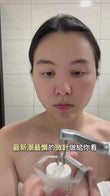0.2 mm Soluble Hyaluronic Acid Microneedle Roller
🔍 Clinic vs Home
-
Clinic level: Needle length 0.5–2 mm, requires numbing, may cause slight bleeding, costs over a thousand HKD per session, and requires 1–2 days for recovery post-treatment.
-
Home version: Needle length 0.2 mm, nearly painless, can be used after cleansing, with zero recovery time.
Comparison with major home microneedling products:
-
Shiseido MicroClick — 0.02 mm / 18 needles disposable, 1.4 ml approximately HK$2,280.
-
Lancome Nano Booster — 0.08 mm / 400 needle chip, main device approximately HK$2,500.
My Skin 0.2 mm dissolvable hyaluronic acid microneedle roller
-
Made in Taiwan, medical-grade process, 1 box contains 4 replacement heads usable for 1-2 months.
-
The needle body dissolves in the deeper epidermal layer, delivering active ingredients for absorption without metal sensitivity.
-
Surface tension test: Absorption capacity significantly improved; slight redness in the bone position and neck subsides in 15 minutes.
-
Half-face practical test: Noticeable improvement in pore contour after one treatment. Paired with My Skin collagen-repairing spray, replicating "baby skin glow."
Premium technology original price HK$533 → Group purchase price HK$400!
Use once every 1-2 weeks, process:
-
Thoroughly cleanse and dry the skin
-
Open the microneedle roller packaging
-
Attach the roller to the handle
-
Roll back and forth on the areas of the face that need enhancement
-
Evenly apply serum to the entire face
-
Use the roller again to help the serum absorb
-
After completion, proceed with the subsequent skincare routine in order
Package: Roller 4EA, Handle × 1EA
Shelf Life: 3 years when unopened.
Ingredients: Hyaluronic Acid, Maltodextrin, Propanediol, Sodium Benzoate, Allantoin, Polysorbate 20, Water
– Frequently Asked Questions Q&A
Q1|Why use hyaluronic acid (HA) for microneedling?
-
HA is naturally present in the skin matrix, high biocompatibility, so there is no need to worry about metal allergies or silicone debris residue.
-
After dissolving, it forms a "moisture gel," conveniently bringing small molecular actives deeper into the epidermis.
-
Biodegradable, no sharp waste; friendlier to sensitive skin.
Q2|What is the difference between 0.2 mm and 0.02–0.08 mm, 0.5 mm?
-
0.02–0.08 mm: Only penetrates the stratum corneum, introduces a shallow effect that is slow to show results but has the lowest pain sensation.
-
0.2 mm: Directly reaches the epidermal spiny cell layer, can trigger a slight repair response, almost painless, no bleeding.
-
0.5 mm↑ (clinic level): Enters the dermal papilla layer, stimulates collagen proliferation the most, but requires anesthesia and professional disinfection.
→ For a safe "perceptible upgrade" at home, 0.2 mm is the most balanced.
Q3|Which is safer, soluble microneedles or hard nano chips?
-
Soluble needles are single-use → lose their tips once dissolved, with a cross-infection probability of approximately 0.
-
Hard nano chips require alcohol or UV disinfection, making it difficult to clean all corners 100% at home.
-
The roller design can also reduce "single-point repeated pressure," leading to quicker reduction of redness.
Q4|How often is it most suitable to use?
-
It is recommended to use once a week, with one month as a treatment cycle (a set of 4 heads is just right).
-
For sensitive skin, you can start byreducing the dosage by half: once every 2 weeks, and increase the dosage if there is no discomfort.
Q5|What skincare should be used after?
-
First layer: Alcohol-free, fragrance-free soothing spray or repair essence (such as a repair spray containing baby protein).
-
Second Layer: Repair Cream.
-
Avoid for 2 days before and after: High concentration acids, alcohol-containing toners, and high-temperature exposure.
Q6 | Can sensitive or acne-prone skin use this?
-
Imagine doing weight training: Healthy skin = muscles without obvious strains before training, micro-needling acts like a "low-load, high-repetition" stimulus for the skin; the needle tips create extremely fine "muscle fiber fissures," prompting the body to activate its repair mechanisms, delivering collagen and growth factors, ultimately making the "muscle"—the stratum corneum-dermis structure—thicker and smoother.
-
Redness and swelling outbreak period = muscles are in acute inflammation: At this time, heavy lifting will only expand the tearing surface, prolonging the recovery period and potentially leaving scars. Similarly, performing micro-needling while the skin is in active inflammation places excessive load on the barrier, easily leading to more severe peeling or secondary infections.
-
Recommendation:
-
First stabilize the inflammation (such as drying out acne, reducing redness) — just like allowing muscles to rest until they are no longer painful.
-
Immediately replenish "nutrients" after micro-needling: Top soothing spray and repair essence = high protein + amino acid supply, promoting "excessive recovery."
-
Once every 1-2 weeks, allowing the skin sufficient "recovery days."
-
Q7 | Can a replacement head be reused?
-
Single-use: The needle body is made of hyaluronic acid, which partially dissolves into the skin and loses its tip structure during rolling.
-
Using it again has no penetrating power, and it is difficult to fully disinfect, making it easy to introduce bacteria; for safety and effectiveness, dispose of after one use.
Q8|If there are warts on the skin, can micro-needling cause infection?
-
Warts are caused by viruses; if the micro-needle directly rolls over the wart, the virus can spread to nearby healthy skin through the newly created small channels.
-
For safe use, please treat or cover the wart before proceeding with micro-needling.
Action Guide
-
Single Wart: First, cover the wart with medical adhesive tape/water gel patch (such as acne patch), avoiding that area while rolling the rest of the skin as usual.
-
Multiple Warts / Prone to Spread (such as flat warts): It is recommended to seek treatment from a dermatologist (cryotherapy, acid treatment, etc.) and ensure complete healing before considering micro-needling.
-
24 hours post-procedure: Keep the face clean and avoid frequent touching to prevent viruses or bacteria from entering the micro-pores.




















